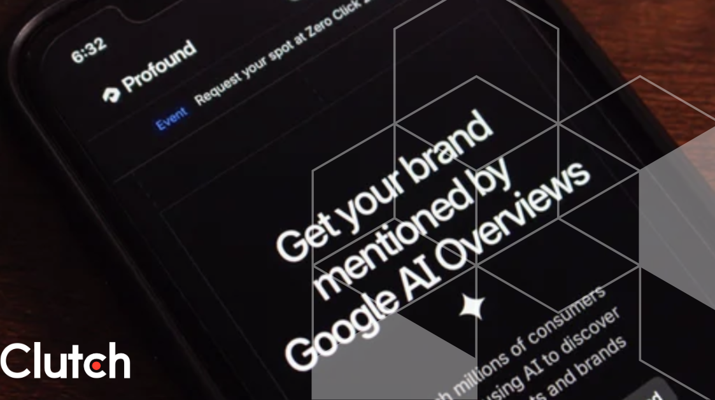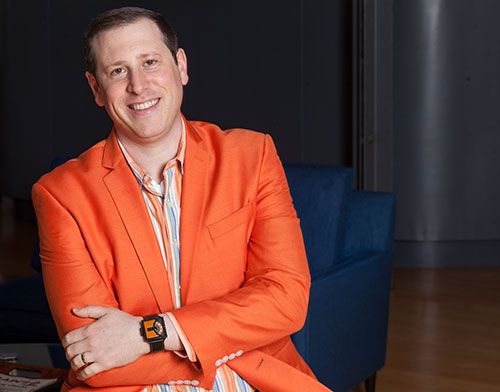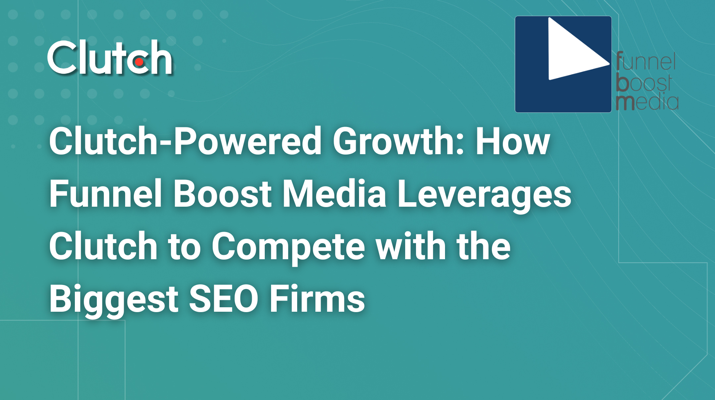

Updated January 7, 2025

Clutch spoke with Dan Golden, President and Chief Search Artist at Be Found Online, about the specialist versus full-service agency model approaches. Dan goes into the benefits and drawbacks of each approach and suggests a new hybrid model or “grey label” approach.
Looking for a SEO agency?
Compare our list of top SEO companies near you
Learn more about Be Found Online on their Clutch profile or at BeFoundOnline.com

When you talk to prospects, you'll ask about budgets, and how quickly they're looking to make an impact. When it comes to clients interviewing agencies, it can be the other way around: an agency interviewing a client, to make sure their expectations are aligned with reality. There are channels and tactics we can affect very quickly, like paid search, or work in the social arena.
Ultimately, it builds up over time. Clients will come to us in Q1, wanting to rank for a high-value keyword by March. That would not be a relationship what would work for either of us. There are startups we've worked with that have a lot of pressure on them: they've raised money, and need to show results immediately.
Putting our strategy hats, on, we would say that SEO, building up your social presence, and developing content is critical to the long-term growth and sustainability of their business, but they're not going to be in business if they can't raise money the next quarter, and we need to move the needle; so, you might tilt recommendations more towards paid media, and quick hit tactics. It's good to understand not just what their goals are, but also make it clear that these are long-term investments; they are not necessarily marketing expenses that need accountability that month or that quarter.
We've been involved on both sides of the equation. We do work for full service agencies that don't have the search and digital expertise in-house. They drive brand visions, and execute campaigns across TV, radio, print, and do some digital marketing in-house, but want the best when it comes to SEO, search marketing, and local activity. We've worked on a number of very large clients and projects, integrating with agency teams, executing a vision of their full-service agency, integrating what they're doing into the search channels. With a number of our larger clients, we have gray labeling, which to me is the best model out there.
We've seen a lot of success with these big clients. We have the search expertise on the front lines. Clients are a lot more educated when it comes to search, these days. We can no longer say the word 'optimize', and blow people's minds. They want to know the details, what kind of ad copy testing we're doing on the SEO side, about the micro-data, dealing with structured snippets. Many clients are a lot more tactical, and come from a strong digital background. In a lot of cases, it's very important to have specialists on the front lines.
To do that, it's important to have transparency, in terms of who they're working with. We did a lot of while labeling when we started. We would basically put on a different hat, depending on our current partner. We still did a good job, but it's a much better experience when everybody's transparent in terms of who's doing the work. In a lot of cases, leveraging experts brings a level of honesty that a lot of clients appreciate. Even if you're operating as one agency team, or consolidating communications, which is beneficial for clients, it's important that they know who's doing the work, and which specialists they're leveraging.
On the flip side, as a full service digital agency, there are a number of things we haven't done in-house, or that haven't been our expertise: email marketing, creative development, web development work that is outside of landing pages. Our approach is to find the best partner out there, bring them to the table, and put together a hybrid team.
For email marketing, we've got a specialist shop that sit in our office a few days a week. We're leveraging someone who's done email marketing for ten years, and our clients know that. We're able to achieve much by not having someone in our team pretend to be the email guru. If you are transparent, and collaborate well together using the same project management tools, or Basecamp, the net result for the client is a better product.
We’ve been involved in agency-client relationships where the agency wanted to own 100% of the communications. There are benefits and efficiency to that, but we found that there could be a lot lost in translation, especially when talking about digital: the nuances of the Facebook platform, or understanding what's realistic with setting expectations for search programs, paid or SEO. There can certainly be a gap when having a non-specialist on the frontlines, who is making promises and answering client questions that don't necessarily align with reality. That's where we see that model break down. The specialists won't be on the frontlines of communication. It's broken down in terms of over-promising, or improperly promising. It's much better to be honest than to fake it.
That being said, clients don't like to hear you say 'Let me talk to the specialist and get back to you' on every call. That can be very frustrating. We find that the best collaboration happens when the people executing campaigns are on the frontline, strategizing, and hearing directly from the clients what their challenges are. We've talked with clients about paid social campaigns, specifically Facebook. We learned more about their target, and we shifted focus to Twitter and LinkedIn. Even if the account person or team sit in the middle of you and the client, and oversee strategy across all channels, it's important to be there.
There's something to be said for proximity, and meeting in person is a good thing. I think I flew 80,000 miles last year to be on-site with clients. Local talent isn't always the best. There are a lot of small local shops, so I'm not knocking any specific agencies. I think that skillset and agency credentials should trump locality, though. This is true even for heavily verticalized agencies. There are some agencies that are vertical-specific; they know a lot about grocery chains, restaurants, or are B2B only. There's value in industry expertise, but you need to understand the craft in those tactics.
You can look at an agency, and all the services they offer on their site: print, digital, TV, video production, social media, PR. If you go to LinkedIn, you find three people in their company. They are often very talented, but there's something to be said about having a specialist in each of those platforms. This is where we see this model failing. Instead of having a digital department, you have a digital expert.
SEO, for example, means a lot of different things. There's a heavy, nerdy aspect of it, about site architecture, micro-data, understanding search engine crawlers, and crafting page rank and interlinking, which are highly technical. One of the conundrums here is that we don't want sites that are Wikipedia, and we don't want Tumblr; in other words, all images, or all text. The art is finding a middle ground.
A lot of the time, we don't think if it as SEO, but rather marketing content; it's read by humans. Having good writers, brand and tactical experts, is the key. We haven't found the perfect human that can balance all of those things. This is where having established teams provides a benefit.
It is the benefit you get with a big agency, vs. doing it in-house. For what you would pay to hire one SEO person in-house, and hope that they are an expert in technical SEO, site architecture, navigating Google penalties, off-site and video SEO, content reach, social media integration, you get access to a pool of specialists. You get the same draw-back from smaller agencies, with the model of having a digital person, instead of a department.
If you have an agency that pitches you twelve different tactics, and you see four employees for them on LinkedIn, ask questions. The answer might be that they have a partner doing X, Y, and Z, and that can be OK. Not every small agency is a bad route to go. There are a lot of talented smaller ones that have good partners, and get things done. Many do fake it, though.
The case for integrated SEO is growing every year. It's no longer just about SEO. If you're building sites and content for search engines, you've already lost. The changes Google is making in terms of machine learning, site quality, user experience, and building web pages that are engaging, are becoming strong SEO signals.
When we think of it as its own discipline, we're thinking about it wrong. It is intertwined with everything the clients are doing. If you're building video content, there's an SEO aspect to it. There's an SEO aspect to press releases. The process doesn't do well on an island. There are a lot of stakeholders in terms of a site: the PR and marketing departments, localized content for smaller businesses, etc. We have clients with fulltime employees dedicated to SEO, that still have a $20,000 a month retainer for our services. There's that much going on. Successful programs are integrated with every department. Any piece of content can provide an SEO benefit, and many times you don't have to rethink everything, but just tweak things a little bit, and make sure you're focusing on the right keywords, and placing content in the right ways, to be advantageous to the search engines. The best content isn't written for SEO, though.
There are a lot of one-person marketing departments for very big companies. In those cases, working with six other specialist shops, they can spend all of their time managing communications, and not the brand. Being realistic about in-house resources and what kind of model will work for them is key. There's a best way to execute involving the day-to-day management and requirements on the client side.
About Be Found Online:
Be Found Online is a Chicago-based digital marketing agency. Founded in 2009 as a search agency, we’ve since grown tremendously and we now offer a full suite of digital marketing solutions including organic media, paid media, local search, and digital analytics.
Our team lives at the intersection of art and science, staying ahead of trends and going beyond any routine approach. Inspired by creativity and analysis, we work to pioneer the digital marketing landscape to drive continuing evolution and deliver exceptional service for our clients.
About Dan Golden:
Dan Golden is a veteran digital marketing executive & speaker known for famously and accurately predicting that last year, this year, and next year will all be the “year of mobile.” A graduate of Northwestern University with a B.A. in Economics, Dan is a search geek at heart and still spends time auditing accounts, testing new tactics, diving into analytics, and making strategic recommendations for his clients. Dan co-founded the digital agency Be Found Online and has lead the BFO team from its roots as a paid search agency to a full service performance digital media agency; optimizing paid advertising across search, display, social, and mobile with the same level of rigor as search accounts.


